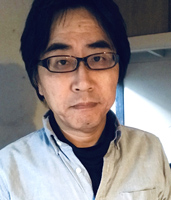Decentralized Micro Book Festival Nakamata Akio (Literary Critic)

“Literary Flea Markets” held in major cities across Japan, including Tokyo, are already becoming the cornerstone of alternative publishing distribution in Japan. Not only ordinary people who create simple publications called ZINEs, but even commercial publishers and bookstores have joined in, and are beginning to see the people who gather at these events as a market. On the other hand, some people are critical of the thriving literary flea markets. They have expanded too much in scale, and appropriate communication about books is being lost there.
Among those who think like this, people have emerged who are creating book events that are much smaller than large-scale fairs such as “Literary Flea Markets.” One of these is the “Umeyashiki Book Festa,” which is held continuously by “Yoyosha,” a publisher and bookstore in Umeyashiki, Ota Ward, Tokyo. In a small space called Senrokuya Cafe under the railway tracks of Keikyu Umeyashiki Station, independent bookstores, individual zine creators, literary scholars, and translators gather for a book fair and talk event. I first visited the event as a guest at the fifth event held in March this year, and got to know the organizer, Kotani Teruyuki of Yoyosha. The story of how he started his own business at the age of 50 after working as a reporter, magazine editor, book editor, and working overseas is written in detail in his book “Hon wo tomosu” (Jiji Press Publishing Bureau), which I also bought at the event. I also visited the Yoyosha store near the event venue, and the small store was filled with many people, mainly women, and it was clear that it was a place for people who value books. I myself plan to set up a stall at the Umeyashiki Book Festa this fall.
These events are not only held in Tokyo. Shigakusha, a publisher specializing in Chinese history books, is based in Ichikawa City, Chiba Prefecture, and under the trade name “Shoshi Imasu,” it also edits and publishes novels of contemporary literature, and actively participates in events such as the Literary Flea Market. The company’s manager, Hirabayashi Ryomo, came up with the idea to hold the “Ichikawa Book Festival” in the multipurpose space “Musububa” inside JR Ichikawa Station. The first event was held in February this year, and the second in June, and was attended by independent bookstores, solo publishers, and novelists. I also participated with my own publishing label, “Hasenbo.” This venue is also small, but it is conveniently located right outside the JR ticket gates, so customers come in continuously. However, most people are unaware of events like the Literary Flea Market, and at first they look around with quizzical eyes. But as they get into lively conversation with the sellers, they tend to stay for a long time. Compared to the Literature Flea Market Tokyo, which had over 10,000 participants, this is a much smaller event, but it is able to achieve decent sales each time, likely because of the intense communication that takes place here.
I think the future of books and bookstores lies in small-scale book festivals held in a decentralized manner all over the country, and not just large events like the Literature Flea Market.
Why not make it a habit and change your life to one with fewer illnesses?
※Translating Japanese articles into English with AI
